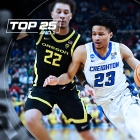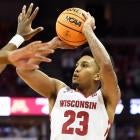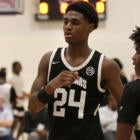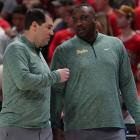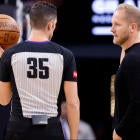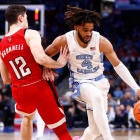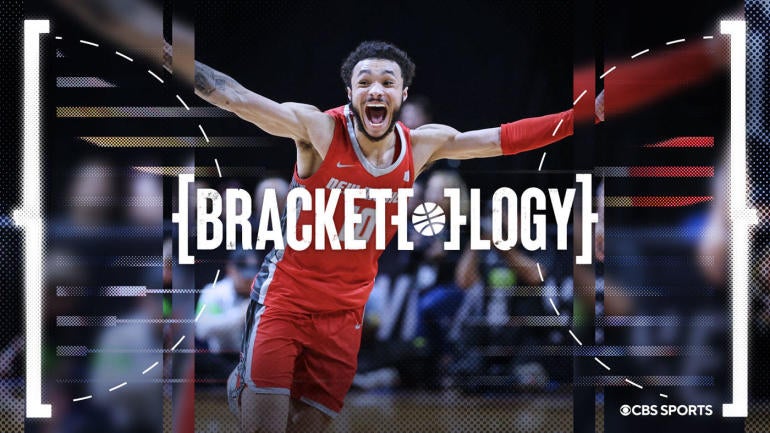
The 2024 NCAA Tournament bracket is out and the selection committee had a tough job this season. They were dealing with what we all thought were four bid stealers, only to learn it was actually five.
Four were obvious. Oregon, NC State, Duquesne and UAB all had to win their conference tournaments to play in the NCAA Tournament. However, selection committee chairman Charles McClelland told us during the Selection Show that New Mexico, which was thought to be in the field of 68 as an at-large before it won the Mountain West Tournament, also stole a bid.
For those of you who think metrics mean a lot in the selection process, the Lobos were 22nd in the NET (before and after the Mountain West title game) and were also top 25 in KenPom and KPI. They would have set the record for the highest rated team left out in the NET era and fallen one spot short of Missouri State's record in the RPI era. The Bears were 21st in the RPI in 2006 and left out of the field.
That was part of a pattern of surprisingly low seeds for teams in the Mountain West. San Diego State was a No. 5 seed, which was no surprise, but no other team was seeded higher than Utah State as a No. 8 seed. Boise State and Colorado State are in the First Four as No. 10 seeds. Nevada is also a No. 10 seed.
It's Bracket time! Play for a Nissan Rogue and Final Four® trips by playing our Men's and Women's Challenges.
When asked about the low seeds for the Mountain West on CBS Sports Network, selection committee vice chairman Bubba Cunningham said that the committee noticed that most of each team's best wins came in conference games.
San Diego State had wins over St. Mary's and Gonzaga in nonconference play while Boise State also beat the Gaels. Nevada has a win over TCU and Colorado St beat both Creighton and Colorado.
That is six total for the six teams in the field. However, it isn't like the nonconference schedule rankings were universally poor, which is something the committee brought up while discussing other teams.
For example, Iowa State was not only denied the fourth No. 1 seed but was given the fourth No. 2 seed largely due to a poor nonconference schedule. It was indeed putrid, ranking at No. 324, but this is a team with 10 Quad 1 wins, tied for fourth behind the top three No. 1 seeds UConn, Houston and Purdue. The Cyclones overall SOS is 16, which is better than UConn's and North Carolina's, so they were able to overcome taking the first two months off.
I understand the desire to encourage teams to play better nonconference schedules, but the strength of full schedules should be valued as highly.
If you looked at the committee's first four out, which somehow does not include St. John's or Virginia, you see Oklahoma with a Nonconference SOS ranking of No. 247, Seton Hall at No. 228, Indiana State at No. 187 and Pitt at No. 343. The best way to get left out of the tournament has always been to fail to test yourself outside your league and not distinguish yourself inside it.
Regional rundown
Looking at the strength of the regions, I feel like they are reasonably balanced. If you add up the overall seed numbers of the top four teams in each region, the range goes from 32-36.
UConn could face conference tournament champs in East: The top four seeds in the East all won their conference tournament titles, but only the reigning champion UConn Huskies won the regular-season title also. They figure to be an overwhelming favorite in their region despite the quality of their No. 2-4 seeds Iowa State, Illinois and Auburn. The Cyclones will be feeling especially high after that 28-point beatdown of Houston.
Danger ahead for North Carolina in West: The Tar Heels could get Alabama or Saint Mary's in a potential Sweet 16 game and Arizona as the No. 2 seed. The Wildcats were a No. 1 seed when the committee gave us their top 16 back in February. Despite some hiccups in conference play, Arizona is built to go deep in this tournament.
Midwest is repeat of Maui Invitational: The selection committee decided to replay the 2023 Maui Invitational in the Midwest Region. Purdue won that event in November. Two of the three teams they beat, No. 2-seed Tennessee and No. 5 Gonzaga are in this region, as is No. 4 seed Kansas.
A No. 5 seed seemed pretty high for a Gonzaga team that was just on the bubble. As it turns out, the Zags were actually a No. 6, but swapped with BYU so the Cougars could get a draw that keeps them from playing on Sunday because of their religious policies. A No. 6 seed seemed pretty high as well considering their strength of schedule.
Not an easy path for Houston: The No.1 Cougars have Kentucky as a No. 3 seed in its region. The Wildcats figure to be the pick of many to come out of there. As always, talent is not the problem at Kentucky. The Wildcats may not play enough defense to make those picks come true however.
Marquette, the No. 2 seed in the South, is the only Maui Invitational participant not in the Midwest region. Tyler Kolek will be back with the Golden Eagles for the tournament after missing the Big East Tournament due to an oblique injury.
Duke is the No 4 seed in that region and is coming off an upset loss to NC State in the ACC Tournament. They always have the talent to succeed, but have been off their best form lately, losing two in a row entering the NCAA Tournament.
It should be a great tournament! Thursday can't get here fast enough for me.
Get every pick, every play, every upset and fill out your bracket with our help! Visit SportsLine now to see which teams will make and break your bracket, and see who will cut down the nets, all from the model that beat over 92% of CBS Sports brackets players three of the last five years.













